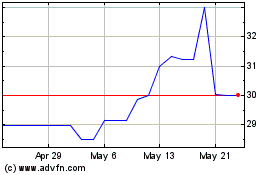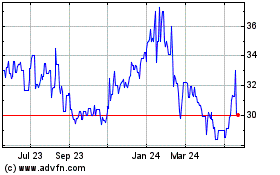Last Chance for Canadian Content: Quebecor Tells CRTC Canada Must Move Quickly to Meet the Challenges of the Digital Age
April 15 2008 - 9:01AM
Marketwired Canada
Canada must prepare to meet the challenges of the digital age by promoting the
production of high-quality Canadian content and meeting the needs of consumers,
who increasingly are able to watch the programs they are interested in when and
where they want, on the platform that suits them best. If it fails to adjust to
the new realities, Canada will, to all intents and purposes, have chosen to lock
itself out of the global television industry. Pierre Karl Peladeau, President
and Chief Executive Officer of Quebecor Inc., made the comments today, arguing
that the approximately 400 rules and regulations governing Canada's broadcasting
industry - many of which were designed for a world that no longer exists - are
stifling this country's potential to play a leading role in the industry.
Reforming the regulatory framework to promote Canadian content
Mr. Peladeau surveyed the new digital environment and maintained that Canada
needs to realize that its broadcasting system cannot long survive in its current
state, with potentially dire repercussions for Canadian content and the people
who produce it. "Within a few years, the Internet may be the main distributor of
television programs, piping content over a global network that escapes
regulation."
Mr. Peladeau noted that a distribution monopoly no longer exists in Canada:
consumers can almost always choose between cable and satellite, and increasingly
can opt for new distribution services such as IPTV, mobile broadcasting and the
Internet. "Given this context, if regulation has the effect of limiting consumer
choice or artificially increasing the cost of services without adding value,
consumers will simply turn their backs on the system and find what they want
elsewhere."
Specialty channels
"The specialty channels are no longer fringe players. The regulatory setup that
allows the specialty channels access to advertising revenues in addition to
mandatory carriage fees gives them a formidable position in the advertising
marketplace, since they are able to offer advertisers very attractive
multi-channel packages. Together, they dominate the market, while the market
share of conventional broadcasters is melting like snow in the sun."
Private conventional broadcasters are being squeezed. They cannot count on
advertising revenues to ensure their profitability and survival. Meanwhile, they
are subject to wildly disproportionate regulatory obligations and costs, when
compared with the specialty channels. And yet it is up to the conventional
broadcasters to provide the lion's share of Canadian content in the form of full
news and current affairs coverage, major dramatic series and diverse
programming. "We have to try to square the circle and survive without carriage
fees, with falling advertising revenues and an unchanging regulatory burden.
This is a situation that cannot long endure."
Fees for all channels
Quebecor believes that all broadcasting services - conventional broadcasters and
specialty channels alike - should be entitled to collect carriage fees. The
offering party, the broadcaster, should be able to sit down with the distributor
to settle on a fair price for the product, terms and conditions for the
distribution of the service, and its inclusion in the packages offered to
consumers. Quebecor believes each broadcaster should be entitled to a fair price
for its products, which means the right to withhold permission for a distributor
to carry its channel or channels. The resulting dynamic would force the three
central players in the broadcasting system - broadcasters, producers and
distributors - to excel in order to claim their place in an industry that soon
will have no borders:
Undue advantages for public broadcasting?
Mr. Peladeau also pointed out that the public broadcaster is in a much more
advantageous position, with four revenue streams: a substantial government
subsidy, a large portion of the funds distributed by the Canadian Television
Fund, advertising revenues, and carriage fees from its specialty channels.
"It is baffling that while the LCN all-news channel, owned by TVA, has the
largest audience share in its market, RDI, the CBC's French-language news
channel, collects a carriage fee three times as high. It is also shocking to
learn that the public broadcaster is now calling for carriage fees for its two
main channels. As a public service, the CBC cannot contend it is part of the
same free market as private broadcasters that take real risks to offer their
audiences a quality product, and lay claim to parliamentary appropriations,
advertising revenues, the Canadian Television Fund, and carriage fees for its
conventional and specialty channels, all at the same time."
Canadians want Canadian content
According to a Praxicus survey commissioned by Quebecor, the public agrees: 86%
of respondents favour policies to promote the production of Canadian programming
and Canadian content; 74% support change and innovation in the television
industry; 65% believe the regulatory framework should be reformed to allow
Canada to join the digital revolution as soon as possible.
Repeating Quebecor's commitment to the production of quality Canadian content
and to maintaining the predominance of Canadian content, Mr. Peladeau argued:
"If our goal is to enable Canadians to compete in this lucrative industry, which
is part and parcel of the knowledge economy and a creator of wealth in advanced
societies, we have no choice but to rely as much as possible on the laws of the
market."
www.ocanada.tv website informs Canadians:
Quebecor took the opportunity to announce the launch of a new website,
www.ocanada.tv, which seeks to inform Canadians of the potential for Canadian
television in the future. The site is divided into four fact-filled sections
covering television production, distribution, broadcasting and regulation in
Canada. Each of the four sections contains three subsections: "Did you know,"
which provides information on the state of Canadian television; "The new digital
environment," which surveys the opportunities created by digitization; and
"Building a new world," which discusses ways to promote the creation and
distribution of Canadian content.
Quebecor Inc.
Quebecor Inc. (TSX:QBR.A)(TSX:QBR.B) is a holding company with interests in two
companies, Quebecor Media Inc. and Quebecor World Inc. Quebecor holds a 54.7%
interest in Quebecor Media, which owns operating companies in numerous
media-related businesses: Videotron Ltd., the largest cable operator in Quebec
and a major Internet Service Provider and provider of telephone and business
telecommunications services; Sun Media Corporation, the largest publisher of
newspapers in Canada; Quebecor MediaPages, a publisher of print and online
directories; TVA Group Inc., operator of the largest French-language
over-the-air television network in Quebec, a number of specialty channels, and
the English-language over-the-air station Sun TV; Canoe Inc., operator of a
network of English- and French-language Internet properties in Canada; Nurun
Inc., a major interactive technologies and communications agency with offices in
Canada, the United States, Europe and Asia; magazine publisher TVA Publishing
Inc.; book publisher and distributor Quebecor Media Book Group Inc.; Archambault
Group Inc. and TVA Films, companies engaged in the production, distribution and
retailing of cultural products, and Le SuperClub Videotron ltee, a DVD and
console game rental and retail chain. Quebecor World is a commercial print media
services company with operations in North America, Europe, Latin America and
Asia.
Quebecor (TSX:QBR.A)
Historical Stock Chart
From Jun 2024 to Jul 2024

Quebecor (TSX:QBR.A)
Historical Stock Chart
From Jul 2023 to Jul 2024
